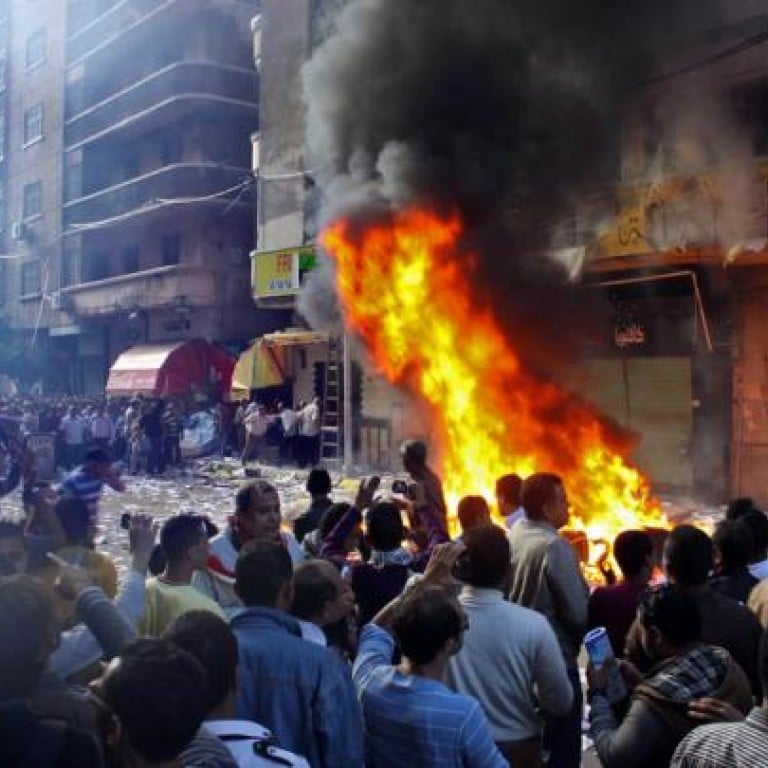
Strife after Egypt's President Mursi assumes new powers
President makes democracy pledge to his supporters outside palace as protesters hold rival rallies over decree that gave him sweeping powers
President Mohamed Mursi yesterday insisted Egypt was on the path to "freedom and democracy", as protesters held rival rallies over sweeping powers he assumed that further polarised the country's political forces.
"Political stability, social stability and economic stability are what I want and that is what I am working for," he told an Islamist rally outside the presidential palace.
Mursi's decree, issued late on Thursday, put himself above the judiciary and also exempted the Islamist-dominated constituent assembly writing Egypt's new constitution from judicial review.
But opponents say he has become a dictator with even more power than president Hosni Mubarak, who was toppled in a popular mass uprising in early 2011.
His opponents staged a rival rally in Cairo's Tahrir Square to denounce Mursi's power grab and some clashed with police. Just hours before Mursi spoke, protesters attacked Muslim Brotherhood offices in several cities, including in Alexandria
"The situation in Alexandria is tense and security forces are eager to exercise self-restraint and maintain security and protect vital establishments," General Abdelmawgud Lutfi, head of Alexandria security, said.
Mursi's backers led by his powerful Muslim Brotherhood gathered outside the presidential palace in north Cairo in a show of support for his decision to temporarily place his decisions above judicial oversight.
"The people support the president's decisions," the crowd chanted.
"I have always been, still am, and will always be, God willing, with the pulse of the people, what the people want, with clear legitimacy," he said from a podium before thousands of supporters.
Mursi's opponents poured into Tahrir Square after the main weekly Muslim prayers, joined by leading secular politicians Mohamed ElBaradei, a former UN nuclear watchdog chief, and Amr Mussa, a former foreign minister and Arab League chief.
"Mursi is a 'temporary' dictator," read the banner headline in yesterday's edition of independent daily .
"Mursi today usurped all state powers and appointed himself Egypt's new pharaoh. A major blow to the revolution that could have dire consequences," ElBaradei wrote on his Twitter account.
Mursi's decree was packaged in other decisions long demanded by many in the opposition, such as sacking the state prosecutor, accused of bungling trials of ex-regime figures leading to their acquittals. It also struck at a judiciary which insists that it is independent but is rife with Mubarak-era appointees whom critics say helped prop up Mubarak's three-decade rule.
"I understand where this is coming from. There is a fundamental problem with the independence of the judiciary in Egypt," said Heba Morayef, Human Rights Watch's Egypt director.
"But these sledgehammer tactics only alienate the legal community," she said.
"This is a coup against legitimacy ... We are calling on all Egyptians to protest in all of Egypt's squares," said Sameh Ashour, head of the lawyers' syndicate, in a joint news conference with ElBaradei and former Arab League secretary Amr Moussa.
A senior official of the Justice and Freedom Party said Mursi's decision was necessary to guarantee the revolution was on course.
"We could not find any legal avenue to pinpoint and prosecute those in the interior ministry who were responsible for killings," Gehad Haddad said.
He said there had been a string of acquittals of interior ministry officials, evidence was withheld in cases, investigations had been weak and many had not been brought to trial over the killings of hundreds of protesters during and since the uprising - a view that secular protesters would agree with. "The avenues we are taking are born of necessity, not choice," he said.
Mursi's decree granting himself extended powers raises very serious human rights concerns, UN Human Rights Commissioner Navanethem Pillay's spokesman said.
He said the decree had many aspects to it so it would take time to analyse.
The decree is bound to worry Western allies, particularly the United States, a generous benefactor to Egypt's army, which effusively praised Egypt for its part in bringing Israelis and Palestinians to a ceasefire on Wednesday.
